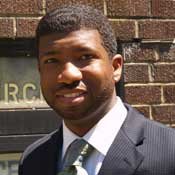As a Christian minister and public theologian, my days are spent in prayerful reflection about souls—not just the immaterial part of us, but all of who we are. For me, to be human is to be a soul—an embodied spirit, a spirited body. And every day, I'm passionate about serving people holistically, touching and transforming mind, body and spirit: all that we are and all that we have.
One of my religion professors at Ole Miss called me a bodhisattva, a Buddhist term for anyone from any tradition who is awakened and seeks to awaken others. Well, that's what I do. I leave spreadsheets, polls and campaigns to the elected and appointed officials, but I seek to awaken them to something deeper regarding the prosperity of our city.
Often, people who make decisions about the future of Jackson, the folks who get to sit at the table, are business people and politicians. These are necessary parts of the much-needed conversation, but they are not altogether sufficient, for citizens are more than capitalistic consumers. We have many needs, economic among them, but that isn't the whole of the story of who we are. We have dreams, desires, hopes, fears, challenges, values, and attributes that go beyond money and politics. We need to address the deeper registers of our humanity to truly cultivate a great city.
What I'm after is beloved community.
I'm riffing off a term made popular by Martin Luther King Jr., who was keenly aware that the Civil Rights Movement wasn't simply a protest movement. It was his determination to create a world where all God's children live together in peaceful coexistence. That world was about reconciliation and redemption, the creation of the beloved community.
As King said, "desegregation will only produce a society where (people) are physically desegregated and spiritually segregated, where elbows are together and hearts apart. It gives us social togetherness and spiritual apartness. It leaves us with a stagnant equality of sameness rather than a constructive equality of oneness."
We need to regain the spiritual genius of "beloved community," and seek to cultivate spiritual desegregation, togetherness and constructive equality of oneness. We need people who can work in the kingdom of culture, striving to better the city in rich, creative and ethical ways that include but go beyond the traditional variables of job creation, tax revenue, infrastructure, education and crime.
For me, beloved community is where divergent groups intentionally live together compassionately, creatively, collaboratively and critically. It is an experiment in faith, hope and love. I temper this belief in a beloved community with a kind of hopeful realism. My experiences have instructed me that humans are complex creatures—neither wholly good nor evil—but often contrary to change and doggedly tribal. Many times, a community is merely the unity among people who like each other and look like each other. Cultivating this alternate vision requires determination, patience and spiritual resources. It also requires that we respect differences: We will not always agree; we are not the same. That's OK. Beloved community shouldn't be considered some utopian dream. It can happen, but only through a long-term commitment.
That is why I use the term 'divergent' instead of 'diverse' in my definition. We cannot be naive about how our differences have Balkanized us, segregated us, made us fearful of each other. Addressing issues like economic development, developing green spaces and biking trails, revitalizing blighted neighborhoods, will partly mean we respect yet overcome the things that divide us. It will mean being intentional about promoting and demonstrating respect for the Other, and living as though interdependence is our spiritual birthright.
I've learned to do this through my own odyssey. I've long imagined myself a citizen of the world. Being deeply rooted in my southern black identity, my proverbial branches spread wide to touch the common humanity in all God's children. I bore witness to this through diverse relationships. My grade-school best friend was "white trash," rejected by Copiah Academy because his blue-collar family wasn't good enough. My black classmates reviled him for his redneck heritage, but we loved each other as brothers from other mothers.
I also saw this with a gay Pentecostal brother who long sought deliverance from homosexuality through prayer and fasting, but couldn't pray the gay away. I see this with black Tea Party colleagues considered sellouts; rural white liberals who challenge notions of white southern maleness; agnostic Jews who could no longer sing Yahweh's songs after the Shoah; evangelical feminists who desire traditional marriage and motherhood; evolutionary biologists who believe in Jesus; white women who romantically love black men; first-generation middle-class blacks who were never considered first-class citizens by white society though they were educated and articulate.
The beloved community honors these divergent realities and invites these persons—liberals, conservatives, libertarians, religious, atheistic, immigrant, native, victims, victor, dark skinned and white—to live together as friends and to transform neighborhoods into places of sibling-hood.
By engaging more bodhisattvas who understand that city development is more than political and economic, we can add a much needed dimension of human flourishing to the conversation about how we get the City with Soul back on track. We can become a new southern cosmopolis. We can become a beloved community.
Rev. CJ Rhodes, a Hazelhurst native, attended Ole Miss and Duke Divinity School in North Carolina. He is pastor at Mount Helm Baptist Church.



Comments
Use the comment form below to begin a discussion about this content.